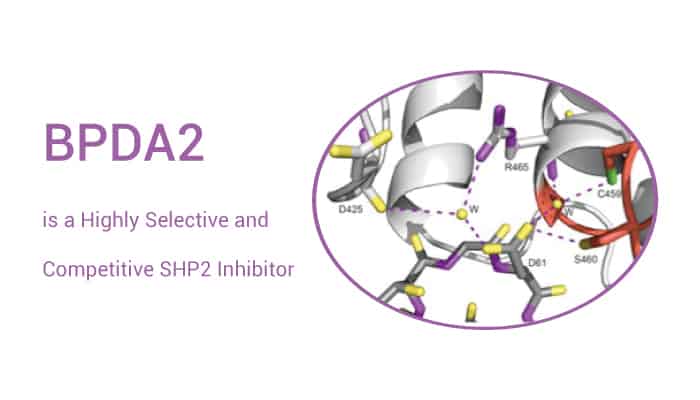SH2-containing protein tyrosine phosphatase 2 (SHP2) is a carcinogenic phosphatase. Specifically, SHP2 participates in the downstream signal transmission of various RTK. So it is the shared signal node for analysis. The phosphatase activity of SHP2 is necessary for important cancer-related signaling pathways (such as RAS and PI3K). Besides, the functionally acquired mutation of SHP2 is a central regulatory factor in tumorigenesis and cancer progression through the cellular autonomic mechanisms. The N-SH2 domain of SHP2 promotes the interaction with other signaling proteins and acts as a conformational switch activated by SHP2. Moreover, SHP2 usually appears as a self-inhibiting conformation, in which the N-SH2 domain binds to the PTP domain and blocks the catalytic activity.
In addition, the up-regulated expression or activity of SHP2 will also reduce the sensitivity of cancer cells to anticancer drugs. SHP2 is a striking target of anticancer drugs. Now, we will introduce a highly selective and competitive active site SHP2 inhibitor, BPDA2.
BPDA2 is a Highly Selective and Competitive SHP2 Inhibitor.

Above all, BPDA2 is a competitive active site SHP2 inhibitor with IC50s of 92.0 nM, 33.39 μM, and 40.71 μM for SHP2, SHP1, and SHP1B, respectively. Importantly, DBDA2 downregulates mitogenic and cell survival signaling and RTK expression. Particularly, BPDA2 suppresses SHP2-mediated signaling and breast cancer cell phenotypes.
Next in importance, BPDA2 inhibits basal activation of Akt and ERK1/2 in a concentration-dependent manner. Obviously, BPDA2 suppresses the anchorage-independent growth and cancer stem cell properties of breast cancer cells in a concentration-dependent manner.
SHP2 regulates a variety of cell signal events that control metabolism, cell growth, differentiation, cell migration, transcription, and carcinogenic transformation. Meanwhile, SHP2 acts as both a phosphatase and a scaffold and plays a significant carcinogenic function. But it can be used as a tumor suppressor in the following ways. Nonetheless, the imbalance of SHP2 expression or activity can lead to many developmental diseases, hematological tumors, and solid tumors.
As a result, BPDA2 is a highly selective and competitive active site SHP2 inhibitor. It suppresses SHP2-mediated signaling and breast cancer cell phenotypes.
References:
Dhanaji M Lade, et al. Eur J Med Chem. 2023 Feb 5;247:115017.